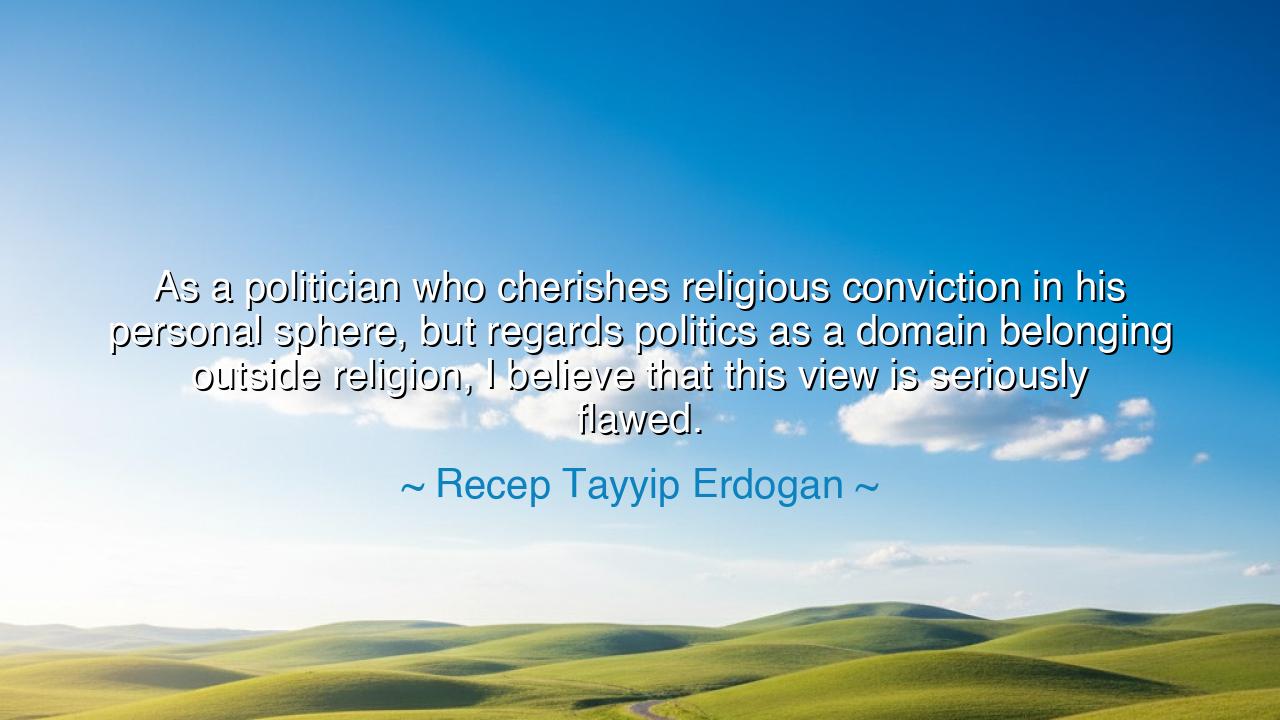
As a politician who cherishes religious conviction in his
As a politician who cherishes religious conviction in his personal sphere, but regards politics as a domain belonging outside religion, I believe that this view is seriously flawed.






"As a politician who cherishes religious conviction in his personal sphere, but regards politics as a domain belonging outside religion, I believe that this view is seriously flawed." These words spoken by Recep Tayyip Erdogan echo with a resonance that calls us to reflect on the relationship between religion and politics, and how the two, seemingly separate forces, intertwine in the lives of rulers and the governed. Erdogan, in his assertion, challenges the prevailing notion that the realm of politics should remain distinct from the realm of faith. His words demand a deeper examination of the profound impact that religious conviction can have upon the political landscape.
The great philosophers of antiquity, such as Plato and Aristotle, often debated the role of virtue and wisdom in governance. They contended that a just ruler must be guided by moral principles—principles that, in many cases, were deeply informed by religious or spiritual beliefs. Indeed, for Plato, the philosopher-king was not only a wise man but a man of virtuous character, one whose moral compass was rooted in the pursuit of truth and justice, often regarded as divine in nature. Similarly, in the ancient world, religion and politics were not seen as separate spheres but were intrinsically connected, as rulers believed their power was granted by divine will. Erdogan’s perspective, in this sense, aligns with the ancient view that spiritual conviction must play a role in the shaping of public policy.
Consider the story of Constantine the Great, the Roman Emperor who famously embraced Christianity and sought to integrate it into the very fabric of his empire. Constantine’s reign marked the moment when Christianity was not only accepted but encouraged as the state religion, fundamentally altering the trajectory of the Roman Empire. His actions were based on a profound belief that religion, particularly his own, was not simply a personal matter, but something that could shape the moral foundation of an empire. In Constantine’s view, politics and faith were inseparable; one could not guide a people without addressing their spiritual needs. This intermingling of faith and politics formed the very basis of his governance and, eventually, the spread of Christianity throughout the Roman world.
However, as time progressed, particularly with the rise of Enlightenment thinkers, the idea emerged that politics should be separated from religion. Thinkers like John Locke argued that the state must remain neutral in matters of faith, allowing individuals to practice their religion freely without government interference. In this way, the separation of church and state became a central tenet of modern democratic societies. This separation, they argued, would prevent the corruption of governance by dogma and allow for a more rational and equitable system of laws that would serve people of all beliefs, or none at all. Erdogan’s position, therefore, stands in stark contrast to this secular ideal, insisting that the moral foundations provided by faith are essential for true leadership.
In the modern context, Erdogan’s views can be seen as part of a larger movement in many parts of the world where political leaders intertwine their religious convictions with their leadership. His words resonate particularly in countries where religion plays a central role in the lives of the people, and where leaders see it as their duty to uphold not only political order but also the spiritual well-being of their citizens. The idea is not to impose faith upon others but to allow religious beliefs to guide decisions and policies that reflect the moral values of society.
The lesson to be drawn from Erdogan’s statement is one of balance and reflection. While some may argue for a strict division between church and state, there remains a truth that cannot be ignored: political leaders who are disconnected from the moral and spiritual needs of their people may lack the guiding principles necessary for true leadership. A leader who cherishes religion in their personal life may well bring a moral clarity to their actions that transcends the often murky waters of politics. Yet, this must be done with wisdom and respect for all beliefs, ensuring that faith is not used to oppress but to guide and inspire.
Thus, we must ask ourselves: can we truly separate our convictions from the way we lead and govern? Can the moral truths of our lives remain confined to our private spheres, or must they find expression in the way we serve and shape our communities? Let us learn from Erdogan’s words to seek a path where faith and politics walk hand in hand, where the ruler is a servant not just of the people, but of the greater moral truths that bind us all. It is only by intertwining conviction and wisdom that we may create a society where justice, compassion, and honor are not just ideals but guiding principles in the life of the state.






AAdministratorAdministrator
Welcome, honored guests. Please leave a comment, we will respond soon